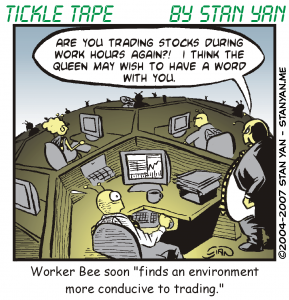Losing weight. Quitting smoking. These are just some of the common resolutions people make on New Year’s Day. Did you make any New Year’s resolutions? If you did, you’re not alone. Most adults make New Year’s resolutions. Unfortunately, few people keep them.
New Year’s resolutions are particularly interesting to psychologists. They illustrate the psychological processes that many people go through to change important patterns of behaviour. (And as regular readers of Innerworth, you should be interested also, since our website is aimed at helping traders change their behaviours and perform in a peak performance mental state).
The same processes that people go through to make New Year’s resolutions are the same processes that traders go through to improve their trading skills, so a review of why people fail, and how to prevent failure, may help you reach the peak level of trading performance you are seeking.
Psychologists Drs. Janet Polivy and C. Peter Herman suggest that there are four reasons people fail. Gaining awareness of these four reasons, and developing a plan to work around them can help you stick with your resolution to change.
First, people think they can make dramatic changes when modest change is more realistic. People reject more modest, achievable goals for ones they can’t possibly achieve. Since their expectations often exceed what is feasible, they fail quickly, feel disappointed, and just give up. An obvious example in the trading arena is expecting to make huge profits with inadequate capital. It’s essential to work with a trading coach or adviser to develop realistic goals.
A second reason people fail is that they underestimate the time it takes to make a substantial change. For example, novice traders assume they can trade profitably in a matter of months, whereas seasoned traders emphasize that such changes may take years. A third and related reason people fail is that they think change is easier than it actually is. It’s hard to change. It requires a heroic effort, yet most people think the only minimal effort is required (It’s like thinking you can trade profitably by treating trading as a hobby rather than as a business). And similarly, it’s hard to master trading.
There’s a powerful human tendency to over-estimate one’s ability level, to overconfidently think that one has skills and abilities that one does not yet have. Don’t ever underestimate the tendency to be overconfident. Conquer the tendency to trade beyond your skills by cultivating a sense of healthy scepticism regarding your trading skills and your trading strategies. And remember, behaviour change is harder than you think.
Finally, people fail in terms of changing behaviour because they overestimate the potential rewards they will receive through behaviour change. For example, they believe that if they can change their behaviour, their life will be ideal. For example, they may believe they will get a big promotion at work or an exciting, new romantic partner. But these expectations rarely materialize and one usually encounters disappointment, and a reluctance to continue on a given course of action. This is especially true of trading. Novice traders envision extreme wealth and the attention it brings. Media images don’t help matters.
Expensive cars and luxurious homes are associated with happiness and bliss, and it’s reasonable for people to think that making huge wins will produce ultimate contentment. But these potential rewards are often unrealistic. It’s wise to make sure that your expectations of reward are realistic. When it comes to trading, long-term enduring financial rewards may take a little while. In the meantime, it is useful to enjoy the process of trading. Trading is a fun and rewarding endeavour in and of itself.
Whether you are trying to keep your New Year’s resolution or trying to make significant changes to your trading approach, it’s useful to accurately estimate the amount of change you can make, the speed at which you can make the change, the difficulty of behaviour change, and the actual rewards you’ll get once you make the change.


